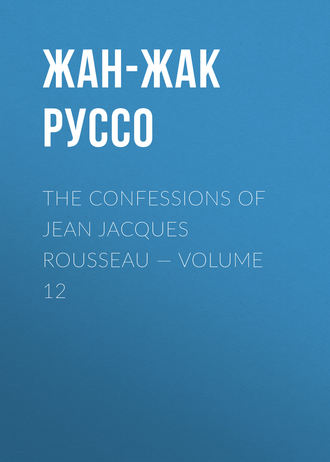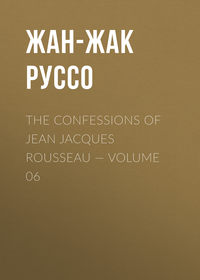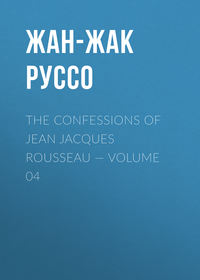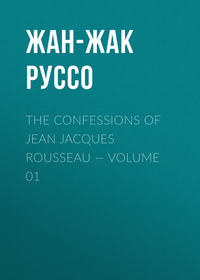 полная версия
полная версияThe Confessions of Jean Jacques Rousseau — Volume 12
I was soon relieved from my inquietude arising from the uncertainty of my asylum, by the answer from his majesty to the lord marshal, in whom, as it will readily be believed, I had found an able advocate. The king not only approved of what he had done, but desired him, for I must relate everything, to give me twelve louis. The good old man, rather embarrassed by the commission, and not knowing how to execute it properly, endeavored to soften the insult by transforming the money into provisions, and writing to me that he had received orders to furnish me with wood and coal to begin my little establishment; he moreover added, and perhaps from himself, that his majesty would willingly build me a little house, such a one as I should choose to have, provided I would fix upon the ground. I was extremely sensible of the kindness of the last offer, which made me forget the weakness of the other. Without accepting either, I considered Frederic as my benefactor and protector, and became so sincerely attached to him, that from that moment I interested myself as much in his glory as until then I had thought his successes unjust. At the peace he made soon after, I expressed my joy by an illumination in a very good taste: it was a string of garlands, with which I decorated the house I inhabited, and in which, it is true, I had the vindictive haughtiness to spend almost as much money as he had wished to give me. The peace ratified, I thought as he was at the highest pinnacle of military and political fame, he would think of acquiring that of another nature, by reanimating his states, encouraging in them commerce and agriculture, creating a new soil, covering it with a new people, maintaining peace amongst his neighbors, and becoming the arbitrator, after having been the terror, of Europe. He was in a situation to sheath his sword without danger, certain that no sovereign would oblige him again to draw it. Perceiving he did not disarm, I was afraid he would profit but little by the advantages he had gained, and that he would be great only by halves. I dared to write to him upon the subject, and with a familiarity of a nature to please men of his character, conveying to him the sacred voice of truth, which but few kings are worthy to hear. The liberty I took was a secret between him and myself. I did not communicate it even to the lord marshal, to whom I sent my letter to the king sealed up. His lordship forwarded my dispatch without asking what it contained. His majesty returned me no answer and the marshal going soon after to Berlin, the king told him he had received from me a scolding. By this I understood my letter had been ill received, and the frankness of my zeal had been mistaken for the rusticity of a pedant. In fact, this might possibly be the case; perhaps I did not say what was necessary, nor in the manner proper to the occasion. All I can answer for is the sentiment which induced me to take up the pen.
Shortly after my establishment at Motiers, Travers having every possible assurance that I should be suffered to remain there in peace, I took the Armenian habit. This was not the first time I had thought of doing it. I had formerly had the same intention, particularly at Montmorency, where the frequent use of probes often obliging me to keep my chamber, made me more clearly perceive the advantages of a long robe. The convenience of an Armenian tailor, who frequently came to see a relation he had at Montmorency, almost tempted me to determine on taking this new dress, troubling myself but little about what the world would say of it. Yet, before I concluded about the matter, I wished to take the opinion of M. de Luxembourg, who immediately advised me to follow my inclination. I therefore procured a little Armenian wardrobe, but on account of the storm raised against me, I was induced to postpone making use of it until I should enjoy tranquillity, and it was not until some months afterwards that, forced by new attacks of my disorder, I thought I could properly, and without the least risk, put on my new dress at Motiers, especially after having consulted the pastor of the place, who told me I might wear it even in the temple without indecency. I then adopted the waistcoat, caffetan, fur bonnet, and girdle; and after having in this dress attended divine service, I saw no impropriety in going in it to visit his lordship. His excellency in seeing me clothed in this manner made me no other compliment than that which consisted in saying "Salaam aliakum," i.e., "Peace be with you;" the common Turkish salutation; after which nothing more was said upon the subject, and I continued to wear my new dress.
Having quite abandoned literature, all I now thought of was leading a quiet life, and one as agreeable as I could make it. When alone, I have never felt weariness of mind, not even in complete inaction; my imagination filling up every void, was sufficient to keep up my attention. The inactive babbling of a private circle, where, seated opposite to each other, they who speak move nothing but the tongue, is the only thing I have ever been unable to support. When walking and rambling about there is some satisfaction in conversation; the feet and eyes do something; but to hear people with their arms across speak of the weather, of the biting of flies, or what is still worse, compliment each other, is to me an insupportable torment. That I might not live like a savage, I took it into my head to learn to make laces. Like the women, I carried my cushion with me, when I went to make visits, or sat down to work at my door, and chatted with passers-by. This made me the better support the emptiness of babbling, and enabled me to pass my time with my female neighbors without weariness. Several of these were very amiable and not devoid of wit. One in particular, Isabella d'Ivernois, daughter of the attorney-general of Neuchatel, I found so estimable as to induce me to enter with her into terms of particular friendship, from which she derived some advantage by the useful advice I gave her, and the services she received from me on occasions of importance, so that now a worthy and virtuous mother of a family, she is perhaps indebted to me for her reason, her husband, her life, and happiness. On my part, I received from her gentle consolation, particularly during a melancholy winter, through out the whole of which when my sufferings were most cruel, she came to pass with Theresa and me long evenings, which she made very short for us by her agreeable conversation, and our mutual openness of heart. She called me papa, and I called her daughter, and these names, which we still give to each other, will, I hope, continue to be as dear to her as they are to me. That my laces might be of some utility, I gave them to my young female friends at their marriages, upon condition of their suckling their children; Isabella's eldest sister had one upon these terms, and well deserved it by her observance of them; Isabella herself also received another, which, by intention she as fully merited. She has not been happy enough to be able to pursue her inclination. When I sent the laces to the two sisters, I wrote each of them a letter; the first has been shown about in the world; the second has not the same celebrity: friendship proceeds with less noise.
Amongst the connections I made in my neighborhood, of which I will not enter into a detail, I must mention that with Colonel Pury, who had a house upon the mountain, where he came to pass the summer. I was not anxious to become acquainted with him, because I knew he was upon bad terms at court, and with the lord marshal, whom he did not visit. Yet, as he came to see me, and showed me much attention, I was under the necessity of returning his visit; this was repeated, and we sometimes dined with each other. At his house I became acquainted with M. du Perou, and afterwards too intimately connected with him to pass his name over in silence.
M. du Perou was an American, son to a commandant of Surinam, whose successor, M. le Chambrier, of Neuchatel, married his widow. Left a widow a second time, she came with her son to live in the country of her second husband.
Du Perou, an only son, very rich, and tenderly beloved by his mother, had been carefully brought up, and his education was not lost upon him. He had acquired much knowledge, a taste for the arts, and piqued himself upon his having cultivated his rational faculty: his Dutch appearance, yellow complexion, and silent and close disposition, favored this opinion. Although young, he was already deaf and gouty. This rendered his motions deliberate and very grave, and although he was fond of disputing, he in general spoke but little because his hearing was bad. I was struck with his exterior, and said to myself, this is a thinker, a man of wisdom, such a one as anybody would be happy to have for a friend. He frequently addressed himself to me without paying the least compliment, and this strengthened the favorable opinion I had already formed of him. He said but little to me of myself or my books, and still less of himself; he was not destitute of ideas, and what he said was just. This justness and equality attracted my regard. He had neither the elevation of mind, nor the discrimination of the lord marshal, but he had all his simplicity: this was still representing him in something. I did not become infatuated with him, but he acquired my attachment from esteem; and by degrees this esteem led to friendship, and I totally forgot the objection I made to the Baron Holbach: that he was too rich.
For a long time I saw but little of Du Perou, because I did not go to Neuchatel, and he came but once a year to the mountain of Colonel Pury. Why did I not go to Neuchatel? This proceeded from a childishness upon which I must not be silent.
Although protected by the King of Prussia and the lord marshal, while I avoided persecution in my asylum, I did not avoid the murmurs of the public, of municipal magistrates and ministers. After what had happened in France it became fashionable to insult me; these people would have been afraid to seem to disapprove of what my persecutors had done by not imitating them. The 'classe' of Neuchatel, that is, the ministers of that city, gave the impulse, by endeavoring to move the council of state against me. This attempt not having succeeded, the ministers addressed themselves to the municipal magistrate, who immediately prohibited my book, treating me on all occasions with but little civility, and saying, that had I wished to reside in the city I should not have been suffered to do it. They filled their Mercury with absurdities and the most stupid hypocrisy, which, although, it makes every man of sense laugh, animated the people against me. This, however, did not prevent them from setting forth that I ought to be very grateful for their permitting me to live at Motiers, where they had no authority; they would willingly have measured me the air by the pint, provided I had paid for it a dear price. They would have it that I was obliged to them for the protection the king granted me in spite of the efforts they incessantly made to deprive me of it. Finally, failing of success, after having done me all the injury they could, and defamed me to the utmost of their power, they made a merit of their impotence, by boasting of their goodness in suffering me to stay in their country. I ought to have laughed at their vain efforts, but I was foolish enough to be vexed at them, and had the weakness to be unwilling to go to Neuchatel, to which I yielded for almost two years, as if it was not doing too much honor to such wretches, to pay attention to their proceedings, which, good or bad, could not be imputed to them, because they never act but from a foreign impulse. Besides, minds without sense or knowledge, whose objects of esteem are influence, power and money, and far from imagining even that some respect is due to talents, and that it is dishonorable to injure and insult them.
A certain mayor of a village, who from sundry malversations had been deprived of his office, said to the lieutenant of Val de Travers, the husband of Isabella: "I am told this Rousseau has great wit,—bring him to me that I may see whether he has or not." The disapprobation of such a man ought certainly to have no effect upon those on whom it falls.
After the treatment I had received at Paris, Geneva, Berne, and even at Neuchatel, I expected no favor from the pastor of this place. I had, however, been recommended to him by Madam Boy de la Tour, and he had given me a good reception; but in that country where every new-comer is indiscriminately flattered, civilities signify but little. Yet, after my solemn union with the reformed church, and living in a Protestant country, I could not, without failing in my engagements, as well as in the duty of a citizen, neglect the public profession of the religion into which I had entered; I therefore attended divine service. On the other hand, had I gone to the holy table, I was afraid of exposing myself to a refusal, and it was by no means probable, that after the tumult excited at Geneva by the council, and at Neuchatel by the classe (the ministers), he would, without difficulty administer to me the sacrament in his church. The time of communion approaching, I wrote to M. de Montmollin, the minister, to prove to him my desire of communicating, and declaring myself heartily united to the Protestant church; I also told him, in order to avoid disputing upon articles of faith, that I would not hearken to any particular explanation of the point of doctrine. After taking these steps I made myself easy, not doubting but M. de Montmollin would refuse to admit me without the preliminary discussion to which I refused to consent, and that in this manner everything would be at an end without any fault of mine. I was deceived: when I least expected anything of the kind, M. de Montmollin came to declare to me not only that he admitted me to the communion under the condition which I had proposed, but that he and the elders thought themselves much honored by my being one of their flock. I never in my whole life felt greater surprise or received from it more consolation. Living always alone and unconnected, appeared to me a melancholy destiny, especially in adversity. In the midst of so many proscriptions and persecutions, I found it extremely agreeable to be able to say to myself: I am at least amongst my brethren; and I went to the communion with an emotion of heart, and my eyes suffused with tears of tenderness, which perhaps were the most agreeable preparation to Him to whose table I was drawing near.
Sometime afterwards his lordship sent me a letter from Madam de Boufflers, which he had received, at least I presumed so, by means of D'Alembert, who was acquainted with the marechal. In this letter, the first this lady had written to me after my departure from Montmorency, she rebuked me severely for having written to M. de Montmollin, and especially for having communicated. I the less understood what she meant by her reproof, as after my journey to Geneva, I had constantly declared myself a Protestant, and had gone publicly to the Hotel de Hollande without incurring the least censure from anybody. It appeared to me diverting enough, that Madam de Boufflers should wish to direct my conscience in matters of religion. However, as I had no doubt of the purity of her intention, I was not offended by this singular sally, and I answered her without anger, stating to her my reasons.
Calumnies in print were still industriously circulated, and their benign authors reproached the different powers with treating me too mildly. For my part, I let them say and write what they pleased, without giving myself the least concern about the matter. I was told there was a censure from the Sorbonne, but this I could not believe. What could the Sorbonne have to do in the matter? Did the doctors wish to know to a certainty that I was not a Catholic? Everybody already knew I was not one. Were they desirous of proving I was not a good Calvinist? Of what consequence was this to them? It was taking upon themselves a singular care, and becoming the substitutes of our ministers. Before I saw this publication I thought it was distributed in the name of the Sorbonne, by way of mockery: and when I had read it I was convinced this was the case. But when at length there was not a doubt of its authenticity, all I could bring myself to believe was, that the learned doctors would have been better placed in a madhouse than they were in the college.
I was more affected by another publication, because it came from a man for whom I always had an esteem, and whose constancy I admired, though I pitied his blindness. I mean the mandatory letter against me by the archbishop of Paris. I thought to return an answer to it was a duty I owed myself. This I felt I could do without derogating from my dignity; the case was something similar to that of the King of Poland. I had always detested brutal disputes, after the manner of Voltaire. I never combat but with dignity, and before I deign to defend myself I must be certain that he by whom I am attacked will not dishonor my retort. I had no doubt but this letter was fabricated by the Jesuits, and although they were at that time in distress, I discovered in it their old principle of crushing the wretched. I was therefore at liberty to follow my ancient maxim, by honoring the titulary author, and refuting the work which I think I did completely.
I found my residence at Motiers very agreeable, and nothing was wanting to determine me to end my days there, but a certainty of the means of subsistence. Living is dear in that neighborhood, and all my old projects had been overturned by the dissolution of my household arrangements at Montmorency, the establishment of others, the sale or squandering of my furniture, and the expenses incurred since my departure. The little capital which remained to me daily diminished. Two or three years were sufficient to consume the remainder without my having the means of renewing it, except by again engaging in literary pursuits: a pernicious profession which I had already abandoned. Persuaded that everything which concerned me would change, and that the public, recovered from its frenzy, would make my persecutors blush, all my endeavors tended to prolong my resources until this happy revolution should take place, after which I should more at my ease choose a resource from amongst those which might offer themselves. To this effect I took up my Dictionary of Music, which ten years' labor had so far advanced as to leave nothing wanting to it but the last corrections. My books which I had lately received, enabled me to finish this work; my papers sent me by the same conveyance, furnished me with the means of beginning my memoirs to which I was determined to give my whole attention. I began by transcribing the letters into a book, by which my memory might be guided in the order of fact and time. I had already selected those I intended to keep for this purpose, and for ten years the series was not interrupted. However, in preparing them for copying I found an interruption at which I was surprised. This was for almost six months, from October, 1756, to March following. I recollected having put into my selection a number of letters from Diderot, De Leyre, Madam d' Epinay, Madam de Chenonceaux, etc., which filled up the void and were missing. What was become of them? Had any person laid their hands upon my papers whilst they remained in the Hotel de Luxembourg? This was not conceivable, and I had seen M. de Luxembourg take the key of the chamber in which I had deposited them. Many letters from different ladies, and all those from Diderot, were without date, on which account I had been under the necessity of dating them from memory before they could be put in order, and thinking I might have committed errors, I again looked them over for the purpose of seeing whether or not I could find those which ought to fill up the void. This experiment did not succeed. I perceived the vacancy to be real, and that the letters had certainly been taken away. By whom and for what purpose? This was what I could not comprehend. These letters, written prior to my great quarrels, and at the time of my first enthusiasm in the composition of 'Eloisa', could not be interesting to any person. They contained nothing more than cavillings by Diderot, jeerings from De Leyre, assurances of friendship from M. de Chenonceaux, and even Madam d'Epinay, with whom I was then upon the best of terms. To whom were these letters of consequence? To what use were they to be put? It was not until seven years afterwards that I suspected the nature of the theft. The deficiency being no longer doubtful, I looked over my rough drafts to see whether or not it was the only one. I found several, which on account of the badness of my memory, made me suppose others in the multitude of my papers. Those I remarked were that of the 'Morale Sensitive', and the extract of the adventures of Lord Edward. The last, I confess, made me suspect Madam de Luxembourg. La Roche, her valet de chambre, had sent me the papers, and I could think of nobody but herself to whom this fragment could be of consequence; but what concern could the other give her, any more than the rest of the letters missing, with which, even with evil intentions, nothing to my prejudice could be done, unless they were falsified? As for the marechal, with whose friendship for me, and invariable integrity, I was perfectly acquainted, I never could suspect him for a moment. The most reasonable supposition, after long tormenting my mind in endeavoring to discover the author of the theft, that which imputed it to D'Alembert, who, having thrust himself into the company of Madam de Luxembourg, might have found means to turn over these papers, and take from amongst them such manuscripts and letters as he might have thought proper, either for the purpose of endeavoring to embroil me with the writer of them, or to appropriate those he should find useful to his own private purposes. I imagined that, deceived by the title of Morale Sensitive, he might have supposed it to be the plan of a real treatise upon materialism, with which he would have armed himself against me in a manner easy to be imagined. Certain that he would soon be undeceived by reading the sketch and determined to quit all literary pursuits, these larcenies gave me but little concern. They besides were not the first the same hand
[I had found in his 'Elemens de Musique' (Elements of Music) several things taken from what I had written for the 'Encyclopedie', and which were given to him several years before the publication of his elements. I know not what he may have had to do with a book entitled 'Dictionaire des Beaux Arts' (Dictionary of the Fine Arts) but I found in it articles transcribed word for word from mine, and this long before the same articles were printed in the Encyclopedie.]
had committed upon me without having complained of these pilferings. In a very little time I thought no more of the trick that had been played me than if nothing had happened, and began to collect the materials I had left for the purpose of undertaking my projected confessions.
I had long thought the company of ministers, or at least the citizens and burgesses of Geneva, would remonstrate against the infraction of the edict in the decree made against me. Everything remained quiet, at least to all exterior appearance; for discontent was general, and ready, on the first opportunity, openly to manifest itself. My friends, or persons calling themselves such, wrote letter after letter exhorting me to come and put myself at their head, assuring me of public separation from the council. The fear of the disturbance and troubles which might be caused by my presence, prevented me from acquiescing with their desires, and, faithful to the oath I had formerly made, never to take the least part in any civil dissension in my country, I chose rather to let the offence remain as it was, and banish myself forever from the country, than to return to it by means which were violent and dangerous. It is true, I expected the burgesses would make legal remonstrances against an infraction in which their interests were deeply concerned; but no such steps were taken. They who conducted the body of citizens sought less the real redress of grievances than an opportunity to render themselves necessary. They caballed but were silent, and suffered me to be bespattered by the gossips and hypocrites set on to render me odious in the eyes of the populace, and pass upon them their boistering for a zeal in favor of religion.









